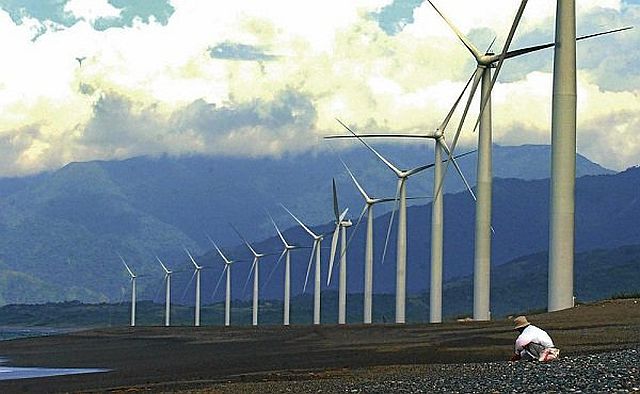
The Department of Energy is pushing for a healthy mix of renewable energy sources like the power from the wind and non-renewable energy sources like baseload power plants to sustain the country’s economic growth. (AFP FILE)
Cebu biz leaders back DOE stand on building more power plants to sustain economic dev’t
With the Department of Energy (DOE) saying that the country needs to build more baseload power plants to push the nation’s economic development, a Cebu business leader is encouraging government to reduce greenhouse gases in other areas instead.
Gordon Alan “Dondi” Joseph, Cebu Business Club president, said he agreed with the DOE stand on the baseload power plants to sustain and propel the country’s economic growth.
“It’s a harsh reality. In the meantime, we can try to reduce greenhouse gases in other areas by incentivizing the management of electricity consumption and waste management,” he said in a text message to Cebu Daily News.
Instead of debating over which power sources to use, he said, the government should immediately address the biggest sources of greenhouse gases in the country like vehicle pollution, illegal garbage burning, and illegal forest clearing by burning and indiscriminate logging.
DOE statement
The DOE, in a statement, said the Philippines cannot completely rely on renewable energy sources to meet its electricity needs at this point in the country’s economic development despite its commitment last year to cut its carbon emissions by 70 percent by 2030.
Energy Secretary Alfonso Cusi said the country would implement an energy policy that would meet its specific economic requirements.
Cusi said they would chart their own course insofar as energy was concerned to ensure energy supply security, considering that developing countries like the Philippines had low carbon emissions.
Diversified sources
Cusi added that President Rodrigo Duterte was correct in saying that the country is still in the process of industrialization and that they must, therefore, use whatever energy sources are available and affordable for power generation.
“We need diversified energy sources to support our growing economy. The Department of Energy is formulating a strategic fuel policy mix to propel the country’s growing economy. We need to build more baseload power plants while also aggressively pushing for clean energy,” he said.
The DOE issued the statement as a response to recent pronouncements by President Duterte that his administration will not honor the historic Paris Agreement on climate change which was adopted by close to 200 other countries in France in December of last year.
Duterte even went on to say that the covenant was “stupid,” “absurd,” and was something that would set back the country’s economic development.
Cebu biz heads
Aside from Gordon, other Cebu business leaders also agreed with the DOE and President Duterte’s stand on the climate change agreement and on the need for the country to have a healthy mix of renewable and non-renewable energy sources to sustain the country’s economic development.
“The president is correct,” said Cebu Chamber of Commerce and Industry (CCCI) past president Ma. Teresa Chan.
Chan said that industrialized countries shouldn’t pass on the burden of their past actions to developing countries such as the Philippines.
She said these countries didn’t have any regard to the environment when they were at the Philippines’ stage of growth, and they should be made to pay for the damage they inflicted on the planet.
Nonetheless, she said the President’s stand on the matter shouldn’t be interpreted as a license for companies who plan to put up more coal-fired or oil-based power plants to go on a “building spree.”
Safety, info drive
Federico Escalona, executive director of the Philippine Exporters Confederation (Philexport) in Cebu, said that Duterte’s recent pronouncements were an added advantage to these companies.
“Provided that all safety protocols are observed, and these plants are located far from densely populated areas,” he said.
As an industrializing country, he said the Philippines needs both fossil energy as well as renewable sources.
He said the country should slowly comply with the pact while still supporting its industrial base and economic development.
Glenn Soco, Mandaue Chamber of Commerce and Industry incoming president, said the current administration should review the Paris agreement and help the public understand its implications, not only on the environment, but on the economy as well.
“Although we understand the role in protecting the environment especially on climate change, we need to cope with the technology where much support is needed from the international community for us to be able to participate in such an agreement without affecting our economic growth,” he said.
Power statistics
According to DOE statistics, coal-fired power plants remained the major contributor to the country’s total generation with 33,054 GWh or 42.78 percent of the total mix in 2014, followed by oil-based, natural gas, geothermal, hydro, wind, biomass, and solar.
Contrary to Luzon where coal-fired power plants dominate as sources of power, more than half of power generated in the Visayas in the same year came from geothermal power plants while the remaining half came from other sources.